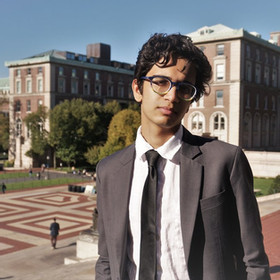
Anish Gvande gives LGBT a voice in Indian politics
Date:

Share post:
In September 2018, the Supreme Court passed a landmark judgment, which decriminalized homosexuality under Section 377 of the Indian Penal Code. It helped to create more awareness and acceptance of the LGBT community of India. Seeing a sea of change, Anish Gvande of the LGBT community of India decided to come forward to initiate the legislative-friendly community supporting queer issues. Anish stepped in to increase the representation of the LGBTQIA+ community in politics. His bold step has brought about a significant change in Indian politics.
LGBT or LGBTQ describes the individual sexual orientation or gender identity – Lesbian, Gay, Bisexual, Transgender, or Queer. Thus, when Anish got an offer from the Indian National Congress to design and execute its Maharashtra political campaign, he grabbed it. Being a part of the LGBT community, he contributed different views for the 2019 legislative assembly campaign. It was the turning point and his entry into Indian politics. Anish used this opportunity to advocate for and help LGBT people enter politics.

The Pink List
After the crazy and fun, with all sorts of madness 2019 political campaign, Anish decided to create Pink List India with journalist Devina Buckshee and freelance designer Smriti Deora. The Pink List is a public archive of political stalwarts who publicly support LGBTQIA+ rights and the queer movement. According to Anish, Pink List will encourage youngsters to step into politics, irrespective of their gender and sexual preferences. In India, this was the first step and equal opportunity for any LGBT individual to enter and contribute to the country’s political affairs.
The Pink List serves as a guide to new political candidates who would like to know who supports the LGBT. It distributes the names of the politicians into four categories, viz:
Trailblazers: Politicians who are either Lesbian, Gay, Bisexual, Transgender, or Queer;
Changemakers: Politicians who openly support queer rights and are vocal about them;
Outspoken Allies: Politicians who have, in the past, demonstrated their support for queer rights on platforms that include the Parliament. They include Rahul Gandhi of the Indian National Congress and Poonam Mahajan of the Bharatiya Janata Party; and
Allies: Politicians who have silently supported the queer community through statements and actions in Parliament.
Pink List India started with candidates contesting the 2019 Lok Sabha elections. Today with Anish’s initiative, there are a record number of LGBT individuals in the poll fray. He brings queer politics and technology together. He advocates accountability and transparency from local elected representatives. His efforts in gender equality and proportionate LGBTQIA+ representation have given India its very own queer politics.
Anish on Section 377
When questioned on Section 377, Anish said, “Queerness has always been stigmatised, been treated as outcaste and has had to contest with and against incredibly violent forms of patriarchy. So the fight against 377 was a landmark fight not only because it overturned the anti-sodomy law which had become the rallying point for the queer movement for many years but also because it was the one thing that brought together all identities within the LGBTQiA+ spectrum under one umbrella cause.”
He further adds, “A court verdict does not mean a sort of magical creation of equality overnight. A court verdict now requires us to go above and beyond. The most important change you are going to see is that more young queer people are coming out than ever before and they are more intersectional and they come from most diverse sets of backgrounds than they ever did before because they are finding themselves on the internet”.
The Queer Journey
Anish knew he was gay but initially did not admit it. Only while interning at the Indian Embassy in Paris, he publicly acknowledged his sexual orientation. After that, he got more comfortable and confident. He went on to intern at CNN and even became a researcher at the Institute for Religion, Culture, and Public Life. He also founded the Dara Shikoh Fellowship – an interdisciplinary residency fostering global cultural dialogue around Jammu Kashmir, and Ladakh. Through his journey, he has openly advocated LBGT rights. He now fights for equal representation of the queer community in the political arena of India.
